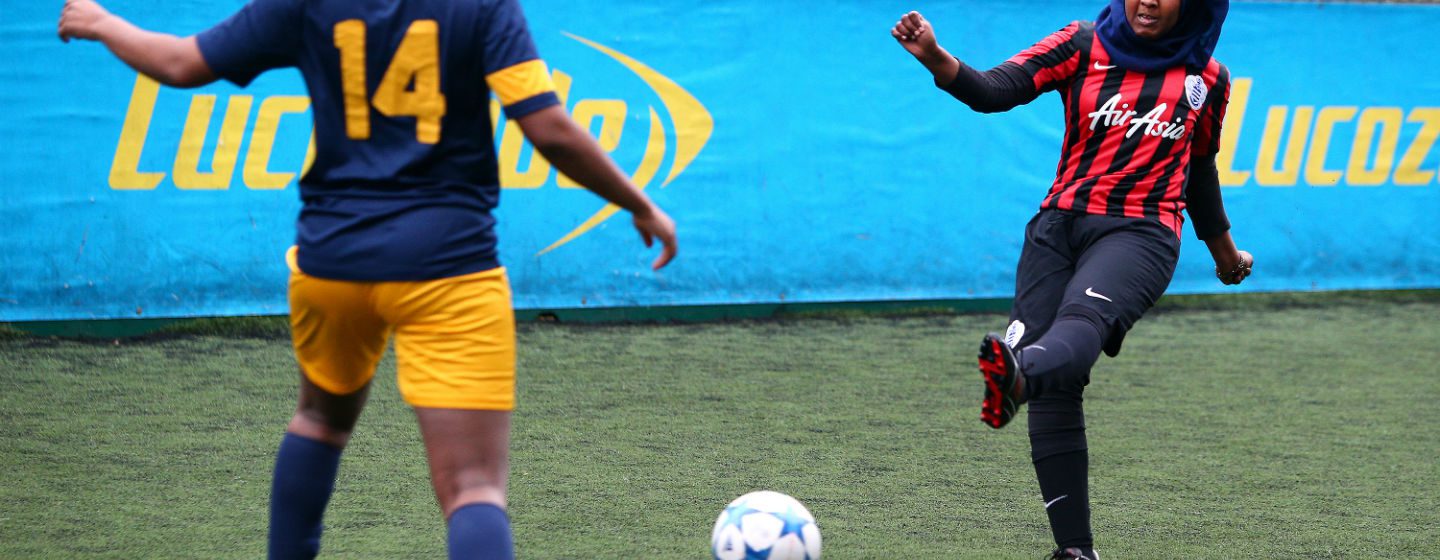Ramadan in the football world
26 April 2021
The English FA has produced an article consisting of guidelines and significant information as Ramadan is approaching. The FA understand the influence and importance of practicing and respecting one’ religion especially whilst playing football and hopes to convey this message in this article.
Ramadan and its meaning
The month of Ramadan is the holiest month in the Muslim calendar. According to Islamic belief, it is remembered as a month of fasting by Muslims worldwide to celebrate the first revelation of the Quran to the Prophet Muhammad (Peace Be Upon Him). Fasting during this holy month is one of Islam’s five pillars, along with prayer and charity. The Islamic calendar is based on the lunar cycle, and as a result, the Holy month of Ramadan starts earlier by approximately 10 days every year. Ramadan is expected to start on the 12th of April 2021, which will be determined on the sighting of the moon, and is expected to end date on the 11th of May 2021 depending on cultural differences.
Ramadan is the most significant and spiritual time of year for many Muslims, as people’s daily routines, activities, and life/work balance can change during this time. Fasting is the emphasis of the month, but people’s mindsets and interactions with others may differ as a result of their focus on faith at this time. Adult Muslims and those who have entered puberty are obligated to abstain from eating, drinking (including water), smoking, desires, foul language, bad behaviour and possible distractions during daylight hours. The fast is broken after sunset with the evening meal known as ‘Iftar’. If an individual is physically or mentally ill, is traveling, or pregnant, fasting is not required. If you fail to commit you might have to fast at a later date or help someone out.
Fasting is common amongst many major religions as its religious practice is regarded as an act of worship.
Ramadan and Football
FA rules state unequivocally that all religions are welcome and will be valued inside football. FA Rule B5: Football & Religious Observance, on page 101 of the 2020/21 FA Handbook, addresses this. In fact, this ensures that no one should be forced to play on a religious holiday unless they have given their permission or are a professional player under contract. In terms of grassroots football, the rule states that any games scheduled during Ramadan could be played after sunset or postponed until after Eid ul-Fitr also known as the ‘Festival of Breaking the Fast’ which is the end of Ramadan celebration. Traditionally, Muslims will take time off for Eid, in the same way Christians would for Easter. The appropriate way to express best wishes to a Muslim at Eid is to say ‘Eid Mubarak’.
There is no fixed age at which Muslims begin fasting, but it is usually after puberty, which may range between the ages of eight and sixteen. This usually has an impact on Muslim youth football participation during Ramadan, especially in older age groups.
As previously mentioned, it is best practice for leagues to inquire in advance about Muslim clubs/teams’ plans to fast and play youth matches during Ramadan.
It is recommended that players who intend to fast while practicing and competing in games during Ramadan do so in consultation with their medical, sports science, and coaching staff to ensure they receive the best possible support.
More recently, the Covid-19 pandemic had little to no direct effect on Ramadan, however, sadly it should be noted that not all traditions can go on as planned e.g. possible family gatherings. Fortunately, grassroots football returned on Monday 29 March 2021 in line with the UK Government’s roadmap out of Covid-19 lockdown restrictions.
Our Tips for Muslim Colleagues and Participants in Football
If you are a Muslim member of staff, player, coach, referee, or other football participant, Ramadan can have an impact on you, especially physically. This is mostly due to the requisite fasting, so maintaining good physical health necessitates extra thought and planning. Fasting is challenging because the body must adjust to not consuming food or fluids during the day. Without regular, fast energy provided by frequent meals during the day, the body is forced to depend on what it can store and then adjust the way it functions. The most serious problem is dehydration. It induces exhaustion, which delays the functioning of many of our bodily organs.
Here are some pointers we hope you’ll find helpful, as well as links to more comprehensive information at the bottom of this guidelines article.
Exercise
The best times to exercise are when you are losing fitness or strength. With daylight fasting in mind, the optimal moment to exercise is about midnight. This is because it is a few hours after you have broken your fast in the evening meal (iftar), giving the body enough time to absorb some food, clear the stomach, and direct blood to the exercising muscles. Furthermore, after exercising at midnight and before going to bed, you have time to consume enough fluid and glucose to replenish muscle glycogen stores after exercise.
Suggested Ramadan Diet For Football Participants
After iftar, we recommend eating at a small amount of quick-release carbohydrates (e.g., dates, fruit, smoothies, and pasta) and drink a whey protein shake to aid in muscle regeneration and recovery. However, do not eat large meals at this time, or your body will go into “storage mode,” causing you to feel sluggish and unable to exercise later.
Before dawn, we suggest you concentrate on carbohydrates that release energy slowly (e.g., non-starchy vegetables like spinach and kale; sweet potato, pasta, nuts, berries, rice, and porridge) in combination with foods that release energy quickly/medium-term (e.g., bananas, eggs, and apples) and to drink plenty of isotonic fluids rather than water – preferably two to four litres. Moreover, extra electrolytes can be obtained from a soluble tablet to aid in water absorption. However, skip suhoor. Whilst getting more sleep may sound appealing, but breakfast is the most important meal of the day, and it is especially important during Ramadan to help you get through the fasting period. Avoid consume rich, greasy, fried, and sugary food as it is known to cause excessive weight gain, and eating fatty and sugary foods increases sluggishness and exhaustion.
The Physical Benefits of Fasting
Fasting is challenging for the body, but it can have the following benefits such as weight loss, improved blood sugar regulation, improved cholesterol levels and decreased inflammation within the body, resulting in lower risk factors for diabetes and cardiovascular disease. On a personal level, it teaches you control and self-control.
Additional information can be found on our website.
Our Tips for Non-Muslim Colleagues and Participants in Football
If you’re a non-Muslim club official, member of staff, manager, or coach who has Muslim peers, colleagues, or players, it’s a great way to learn about Ramadan. This way, you will ensure that your club or team is welcoming and inclusive, which supports The FA’s For All ethos.
Take the time to learn which of your coworkers or players are Muslims and how closely they may observe Ramadan. It’s important to find out without compromising anyone’s privacy. Hence, you’ll be in a strong position to tell your colleagues, other team members, leagues, and planners, for example, about upcoming fixture preparation.
As for every faith, expressing to your Muslim colleagues or team members that you understand this is a special time for them is likely to be appreciated.
If done correctly, acknowledging Ramadan on your website (internal and external), within your team environments, or on social media could be well received. Look on our website for possible suggestions.
Muslims who are fasting do not expect you to stop eating or drinking, but it is courtesy not to eat, drink, or smoke in their presence. As the sunset approaches they will also enjoy sitting together and sharing food at Iftar, and could invite non-Muslims to join them. Fasting with Muslim relatives, even if only for a portion of the day, is a great way to strengthen ties and relationships. Moreover, you should be aware that fasting, along with additional prayers and a lack of sleep, can cause you to feel more tired and dehydrated than normal. Many Muslims would find it difficult to play football or focus on their work, so please be mindful of this.
Furthermore, during Ramadan, Muslims will practice their faith more and give prayers during the day. This is usually two to three times a day (during working hours) for a few minutes at a time when they need a small, clean, and private place.
Muslims can also attend nighttime prayers known as ‘Tarawih.’ Although none of the above would have an impact on your football or meeting schedule, it’s still a good option to be mindful in case you need to make alternate plans.
The FA’s culture is inextricably linked to ensuring that our national sport is accessible to everyone. The game should always be For Everybody. To ensure that this ethos extends to those with strong religious views, the FA has established a “Faith and Football Group” comprised of representatives from all major world religions. Its aim is to advise The FA on any barriers to football that people of faith may experience – or perceive. More information about The FA’s work in this field can be found here, where you can also find valuable tools relevant to the faith spectrum.
Lastly, it is always important to take note of any important religious dates when planning fixtures. To help this, The FA put together a calendar of religious dates. Which is available on our site ….






